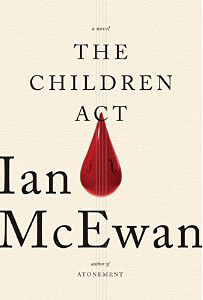Book Notes
 Ian McEwan, The Children Act; A Novel (New York: Doubleday, 2014), 221pp.
Ian McEwan, The Children Act; A Novel (New York: Doubleday, 2014), 221pp.
By Dan Clendenin
Fiona Maye, the protagonist-narrator in Ian McEwan's new novel, knows a thing or two about families in distress. Across the decades, she's earned praise as a High Court judge in the Family Division of Britain's legal system. She's a fair-minded judge who upholds the 1989 Children Act, that "the child's welfare shall be the court's paramount consideration." But in this story, that's easier said than done, especially when her professional and personal lives collide.
After thirty-five years of marriage, and regrets about never having had a child, her husband Jack asks permission to have "one big passionate affair" with a twenty-eight-year-old, and still stay married to Fiona. She had become the sort of person who appeared before her bench every day. "A professional life spent above the affray, advising, then judging, loftily commenting in private on the viciousness and absurdity of divorcing couples, and now she was down there with the rest, swimming with the desolate tide." She's lost in a welter of emotions — self-pity, self-blame, anger, humiliation, emptiness, and abandonment. She tries to go about business as usual; "her hope was that she didn't look too much like a woman in crisis."
The personal and the professional collide again in a different way. In one of her cases, a young man with leukemia wants to reject a blood transfusion because of his religious beliefs; it's the only thing that will save his life. The legal, the medical, and the moral now mash up. Should the court compel the young man to have treatment? Fiona then does something close to breaching professional ethics and common sense — she visits the young man in the hospital. That visit has dramatic consequences for everyone that no one could have foreseen — herself, Jack, the young man, and his family. Had she really upheld the Children Act, both personally and professionally? You'll have to decide for yourself.


